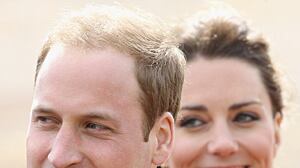Who cares?
It’s a question strangely missing from the exhaustive coverage of the Royal Wedding.
Americans have been subjected to a month-long countdown complete with surveys of souvenirs ranging from commemorative plates to condoms to a signature airsick bag. Flotillas of news correspondents have been dispatched across the Atlantic to ensure that no question goes unanswered, from whether William will wear a wedding ring to whether Kate is still a virgin.

Didn’t we fight a war so we wouldn’t have to pay attention to this sort of thing?
Don’t get me wrong—I wish William and Kate every happiness as a young couple presumably in love. But there’s just nothing less American than monarchy.
George Washington had a chance to become king and wisely rejected the idea, with all its requisite foppery. We are the land of meritocracy, rugged individualism and equal opportunity. The idea of birthright is an invitation to ridicule.
And while Kate Middleton not coming from inbred aristocratic stock is refreshing and might make her a bit more ‘relatable’ to Americans, the fact that she is referred to as a ‘commoner’ indicates just how wide the gap is between our shores. We are all uncommon commoners here, and damn proud of it.
If you can’t bring yourself to care about the pending nuptials you’re far from alone. In fact, a CBS/Vanity Fair poll found that 65 percent of Americans have “no interest” in the royal wedding.
The idea that William and Kate’s wedding deserves the world’s attention is already several centuries stale. And for those who fetishize the remaining whiff of aristocracy—well, there’s a continent for that. It’s called Europe.
And yet the royal countdown continues on our television sets and computer screens. This fascination seems to reflect a generational divide that is particularly prevalent among TV producers who remember the glory day of Charles and Diana’s wedding back in 1981.
We all know that fairy tale didn’t end so well. And while I appreciate how this wedding seems like a story come full circle for some, for Americans under the age of 30 this is much ado about nothing. It’s the big ‘whatever’—a royal bore.
But American media smell big bucks and so they frog-march us into formation, all polite applause and forced enthusiasm, pretending that April 29th is somehow significant. It’s a hallmark holiday, over-hyped and destined to fall flat because—and this almost needs to be whispered—the world doesn’t really care that much anymore who is the next British monarch.
For those who fetishize the remaining whiff of aristocracy—well, there’s a continent for that. It’s called Europe.
In terms of actual influence, it’s somewhere above of the next king of Belgium but below the next prime minister of Canada.
There’s also something odd about fixating on a royal wedding when unemployment in the U.S.A. remains stuck at 8 percent. This isn’t Fred Astaire-Ginger Rogers escapism during the Great Depression—this is a strange fixation on another country’s vestigial organ.
What’s additionally lame is the hours of television and miles of newsprint that have been wasted covering what could and should have been a 72-hour story. Even a portion of the attention could have been usefully directed elsewhere.
The Ivory Coast, for example, where 1,000 people reportedly were massacred recently. Or Sudan, where a referendum peacefully dividing the country after two decades of civil war threatens to be undone by an armed escalation in the contested region of Abyei.
When we ignore real world events in favor of frivolity—not as dessert, but as the main course—we get a little lazier and a little more stupid. We are in danger of amusing ourselves to death.
Fairy tales are a nice archetype that doesn’t have much to do with reality—particularly in the Windsor family line circa the past 30 years, which has been far more schlock soap opera than Shakespeare. In fact, the most romantic story just might be the enduring if crowd-displeasing love of Charles and Camilla, who eventually refused to follow any script other than their own.
I feel for the two princes. In the 21st century they get all the burdens of royalty—cradle to grave scrutiny—but none of the benefits, like a sword they can use with impunity or a harem hidden away in Scotland.
But when I think of the ‘special relationship’ between the United Kingdom and the United States, I think of Winston Churchill and Tony Blair, Roald Dahl and Martin Amis, The Beatles and The Clash—not members of the royal family. Being tapped for the lucky sperm club is not something to celebrate on this side of the Atlantic. It’s a ritual best observed from a respectful distance, like drinking warm beer or eating haggis.
In America, we give month-long countdowns to election days and presidential inaugurations. In slower news cycles, we fixate on the playoffs or Oscar nominees. But we shouldn’t pretend to care about another country’s monarchy—or be force-fed that message by the media.
So say it loud and say it proud—“I don’t care about the royal wedding.” And if you’re really overcome with emotion, there’s always the William and Kate souvenir barf bag.
John Avlon's most recent book Wingnuts: How the Lunatic Fringe is Hijacking America is available now by Beast Books both on the Web and in paperback. He is also the author of Independent Nation: How Centrists Can Change American Politics and a CNN contributor. Previously, he served as chief speechwriter for New York City Mayor Rudy Giuliani and was a columnist and associate editor for The New York Sun.






